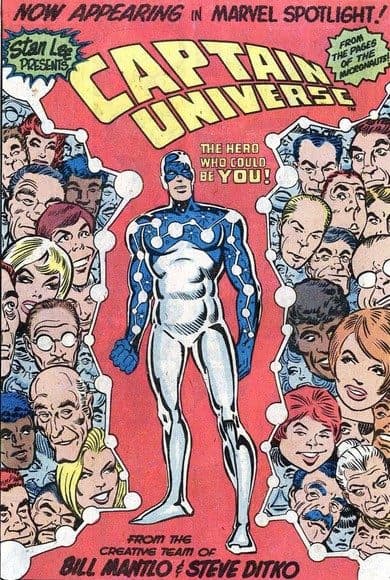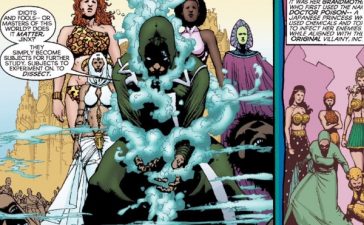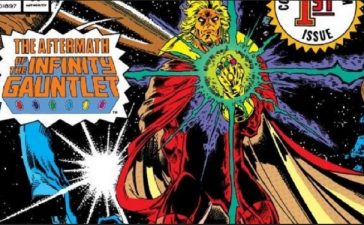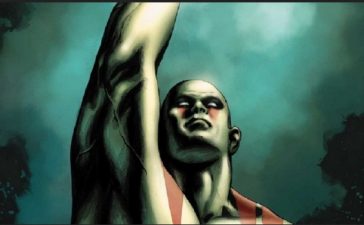
“The Hero Who could be You.” This was Marvel’s original tag line for Captain Universe. The concept was simple: there is a cosmic force called the Uni-Power which has the ability to inhabit a host, bestowing upon that individual immense powers. These abilities are temporary, though, granted in order to face a specific threat. As a child of the 90s, my first and primary association with Captain Universe were the Spider-Man stories from Acts of Vengeance. Recently, however, I read some of the original Captain Universe tales, which hue closer to the concept that anyone, no matter how unlikely, could become a cosmic hero.
Taking advantage of the current Captain Universe’s prominence in Jonathan Hickman’s Avengers, last year Marvel put out an inexpensive collection of early stories (which I picked up at the New York Comic Con for the even lower price of $1). Leaving out his first appearance in the licensed property Micronauts, the collection focuses on the Uni-Power’s early tales from Marvel Spotlight, Marvel Fanfare. Written by co-creator Bill Mantlo (the Micronauts artist was Michael Golden), the first of these stories centers on Steven Coffin. Steve is the teenage son of Raymond Coffin, who wielded the Uni-Power in its debut adventure. This time around, Ray’s body has grown too frail for such energy, so his son is selected instead. Remembering the tales of his father, Steve gets a handle on his newfound abilities to defeat the threat of Mr. E and his shadow minions. Mission completed, Steve finds himself a regular person once again.
This template is more or less followed throughout the collection. However, one additional element which surfaces fairly quickly is a level of social commentary. The next appearance of Captain Universe centers on a pair of twin sisters in Phoenix. One of them, Clare Dodgson, we meet while testifying in a mob trial. The jury convicts the defendant, largely based on her testimony, and the crime boss Nemesis retaliates against the D.A., Edward, who happens to be Clare’s brother-in-law. In order to defeat Nemesis and save their family, both sisters are invested in the Uni-Power. What is interesting in their tale (from 1980) is how Mantlo is clearly writing in response to the women’s movement. Each of the sisters lives in a different sphere, Ann a happy suburban housewife, Clare a tough, accomplished private investigator. Despite these differences in sensibilities, they both rise to the occasion of their new powers, and work together to defeat Nemesis, who once unmasked is revealed to be Ann’s own husband. The district attorney/criminal mastermind pleads with his wife for understanding, claiming that he needed to do this to provide the life to which she had grown accustomed. Ann will have none of it, knocking him out. The story ends with Ann left to care for her two children, as Clare wonders if instead of super powers, all her sister needs is “her own woman’s strength.”
Frankly, I’m surprised this story did not make it into the Women of Marvel omnibus. I guess they had to save space for all those quasi-embarrassing Wonderful Wasp Tells a Tale features. Damn, if those were the best female-centered materials they could find from the 60s . . . anyway, that omnibus is a subject for another day.
Further Mantlo protagonists include Monty Walsh, a cat burglar who seeks revenge against the crime boss who cruelly tries to kill Monty in retribution for an attempted robbery. (The fact that the mob boss is named Guido Carboni shows that some social progress moves more rapidly than others.) The final Mantlo story included centers on Delayne, a studious black teenager in a New York high school. Mantlo portrays the school as a place of disorder, where many of the teachers fear the gangs as much as students like Delayne. Indeed, the moment Delayne becomes Captain Universe is when he comes to the aid of Ms. Leslie, a kindly teacher being beaten by Willie, the same kid who picks on him. Yet, at the vital moment in his confrontation with Willie, the Uni-Power vanishes. Full of newfound confidence, Delayne continues his assault which inspires the other students to join him. In the end, it is courage to stand up for what is right, not any other-worldly abilities, which returns order to W.E.B. DuBois High School. While aspects of these Mantlo stories are dated, overall they reveal a writer interested in telling superhero tales with everyday relevance. This was the first time I had read his work, and I shall keep an eye out for more of it in the future.
Tony Isabella continues the school theme by giving Peter Parker’s science teacher the Uni-Power to defeat a rampaging menace. After that Isabella cooks up an odd little tale in which a baby receives the Uni-Power in order to fight off two demons. (Said demons were conjured the Prices, a husband and wife stockbroker team, who plan to use the creatures to “manipulate the markets.” Yeah, it’s a pretty weird story all around.) Finally, the idea of anyone being able to be Captain Universe is given a humorous riff in a two-page What If story, where a dog gains the Uni-Power in order to save his master from a hot-air balloon ride/marriage proposal gone wrong. This tale concludes with a priceless observation from Captain Uni-Mutt: “Now that the crisis is past, I feel the Uni-Power leaving me. I better get a biscuit for thi—” Dogs, as they say, will be dogs.
Humor aside, this story, along with the baby versus demon-conjuring stockbrokers, highlights a motif that runs throughout all these adventures. Regardless of background, age or even species, all of the Uni-Power’s recipients instantly gain an understanding of their new abilities and how to use them. At least, Steve Coffin possessed a previous awareness of the Uni-Power from his father, an explanation that none of these other characters can match. Despite this, none of them struggles with their circumstances. The lone exception would be Monty the cat burglar who ultimately shows poor moral judgment, even if it only comes after he has accomplished his goal of dismantling Carboni’s rackets. This lack of a learning curve would be revisited and revised not so much at Marvel, but by DC within their similarly themed Dial H for Hero concept. An examination of those stories by Will Pfeifer and Kano, though, will need to wait for another day.








